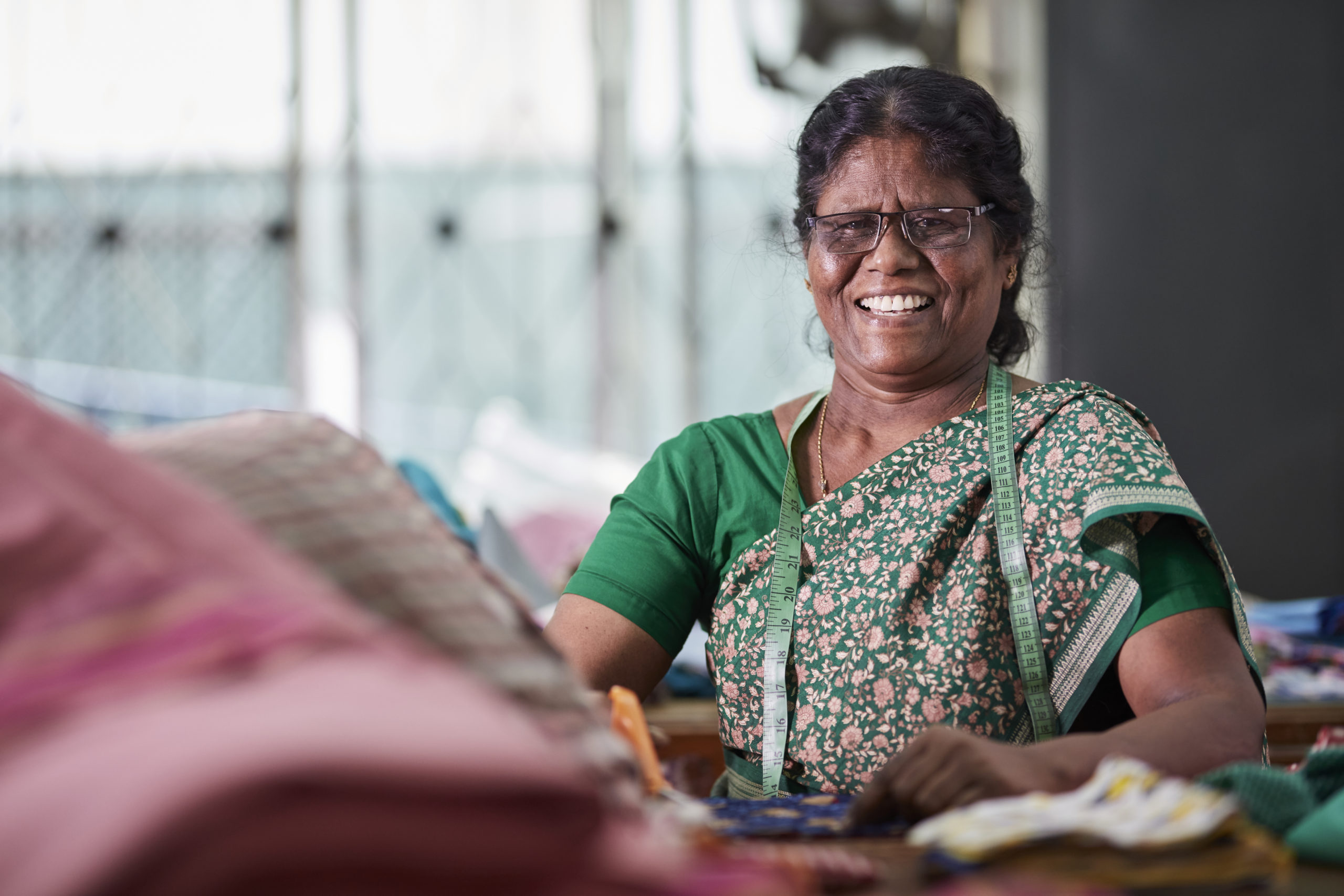A grand pattern: Padmavathy’s story

It’s a busy morning at Padmavathy’s house. Her husband quickly finishes his breakfast before rushing out to fulfill his responsibility of ferrying children to various schools in Chennai. Her older son is still sleeping as he has had a late night at the media house that he works for. Her younger son, who is pursuing a course in civil engineering, has already left for college. Hurriedly, Padmavathy packs up her own lunch, eats ger breakfast and begins the short walk to her job as a team lead at the handicraft center within CMCT, where she has been working for the last 30 years.
“I was just 21 years when I first came here,” she reminisces. “I had finished my schooling at a remote village in South India in the early 80’s. At that time, the next step for most girls was to get married. However, I am so thankful that I had people in life who encouraged me to pursue a career.”
Padmavathy’s mother had been working all through her childhood. She wanted her daughter to be financially independent too.
“My mother encouraged me to be formally trained in sewing, as she herself had been working in the same field with the Village Training Center, an initiative in our village by a service-oriented foreigner from England. At the time, I wasn’t excited by the prospect of tailoring as I wanted to be a nurse. However, the decision was taken out of my hands. I did not meet the minimum age requirements for nursing and decided to pursue a diploma in sewing.”
When she had completed her training, her family encouraged her to qualify herself as a teacher. After a short course and a certificate in teaching, Padmavathy started teaching at a primary school in Dharmapuram. It was at this time that she heard about an opening at CMCT, Chennai. The Village Training Center’s head was a friend of Dr. Colleen Redit. When Dr. Redit asked her if she knew someone who could train others in sewing, Padmavathy emerged as an obvious choice. But would a single girl who had never stepped beyond the boundaries of her village be willing to accept a job that was miles away in a bustling metropolis?
When the idea was suggested to Padmavathy, she was excited. “I was thrilled when I heard that it was a ministry that would equip women,” she says. “I felt so privileged to be asked to take on a task like this. I told my father that I wanted to go. He asked me if I could manage alone and I found myself saying yes, despite my fears. However, our relatives and my own grandmother discouraged me. They kept asking me, ‘How can a young girl like you work alone in a big city?’ Though I assured them that I would be provided with hostel accommodation, the thought of an unmarried village girl leaving the protection of her family to pursue the unknown was not something that was very common.”
One day I would find myself raring to go but the very next day, as the questions from other villagers poured in, I was assailed by doubts. Finally, I decided to end this conflict and made up my mind—unless I left my comfort zone, I would never know what God’s plans for me were.”
Today, almost 30 years later, Padmavathy looks back with immense satisfaction. “CMCT expanded my horizons. I have been able to increase my skills through training programs for which I was sent. I began my career as a teacher, but CMCT has given me the opportunity to be a designer, a leader and a mentor to women from difficult backgrounds. I have found job satisfaction right from day one. Dr.Colleen has taken my opinion on every aspect—right from planning the vision of the center to what we should focus on, how we should impart training and even how to execute a particular piece.”
The handicraft center that started with Padmavathy and a handful of ladies is a bustling enterprise that involves close to a hundred women. As one of the three primary leaders, Padmavathy is looked upon as a figure of authority and uses her position to counsel and direct the women.
“Our women usually come from extremely difficult circumstances,” says Padmavathy. “They struggle with husbands who are alcoholic, or they’ve been subjected to domestic violence and struggle with frustration, anger and sorrow. Sometimes, they are the sole breadwinners. There are days when they are so mentally disturbed and depressed that they cannot even function normally.”
Padmavathy says she encourages them to turn these negative emotions into positive ones by expressing their creativity through various handicrafts. “Not only does the work help to soothe and center them, but creating beautiful pieces gives them a sense of worth and purpose.”
The products are being sold by a leading retailer of artistic goods in Chennai and are also exported to several countries. “I am glad I took that step of faith and plunged into the unknown. Not only did I find my feet, but I’ve been able to use my skills to help others.”
Visit our online gallery to get a sneak peek into the goods being sold by our women.

